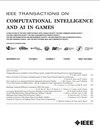网络游戏用户信任系统——第一部分:信任表征的活动理论方法
Q2 Computer Science
IEEE Transactions on Computational Intelligence and AI in Games
Pub Date : 2017-09-01
DOI:10.1109/TCIAIG.2016.2592965
引用次数: 5
摘要
在虚拟世界(包括电脑游戏)中,用户通过与他人的互动建立信任关系。然而,这些信任关系最终没有在这种虚拟世界的数据结构(或数据库)中表示出来,尽管它们有时与声誉和推荐系统相关联。此外,据我们所知,当用户在虚拟或游戏世界中与其他用户互动时,并没有提供一个个人信任工具来支持他/她的决策。为了提出这些个人信任关系的计算形式表示,我们需要成功地将现实世界中的交互转换为可靠的信任相关数据来源。在本文中,我们基于活动理论开发了收集和表示虚拟世界交互所需的形式化方法,以及将虚拟世界交互转换为信任网络的方法。在本文中,我们使用这些信任网络来产生基于主观逻辑的计算信任决策。这个解决方案旨在支持游戏世界中的用户(或角色)对游戏世界中其他人的决定。本文章由计算机程序翻译,如有差异,请以英文原文为准。
A User Trust System for Online Games—Part I: An Activity Theory Approach for Trust Representation
In virtual worlds (including computer games), users develop trust relationships from their in-world interactions with others. However, these trust relationships end up not being represented in the data structures (or databases) of such virtual worlds, though they sometimes appear associated with reputation and recommendation systems. In addition, as far as we know, the user is not provided with a personal trust tool to sustain his/her decision-making while he/she interacts with other users in the virtual or game world. In order to come up with a computational formal representation of these personal trust relationships, we need to succeed in converting in-world interactions into reliable sources of trust-related data. In this paper, we develop the required formalisms to gather and represent in-world interactions—which are based on the activity theory—as well as a method to convert in-world interactions into trust networks. In the companion paper, we use these trust networks to produce a computational trust decision based on subjective logic. This solution aims at supporting in-world user (or avatar) decisions about others in the game world.
求助全文
通过发布文献求助,成功后即可免费获取论文全文。
去求助
来源期刊

IEEE Transactions on Computational Intelligence and AI in Games
COMPUTER SCIENCE, ARTIFICIAL INTELLIGENCE-COMPUTER SCIENCE, SOFTWARE ENGINEERING
CiteScore
4.60
自引率
0.00%
发文量
0
审稿时长
>12 weeks
期刊介绍:
Cessation. The IEEE Transactions on Computational Intelligence and AI in Games (T-CIAIG) publishes archival journal quality original papers in computational intelligence and related areas in artificial intelligence applied to games, including but not limited to videogames, mathematical games, human–computer interactions in games, and games involving physical objects. Emphasis is placed on the use of these methods to improve performance in and understanding of the dynamics of games, as well as gaining insight into the properties of the methods as applied to games. It also includes using games as a platform for building intelligent embedded agents for the real world. Papers connecting games to all areas of computational intelligence and traditional AI are considered.
 求助内容:
求助内容: 应助结果提醒方式:
应助结果提醒方式:


